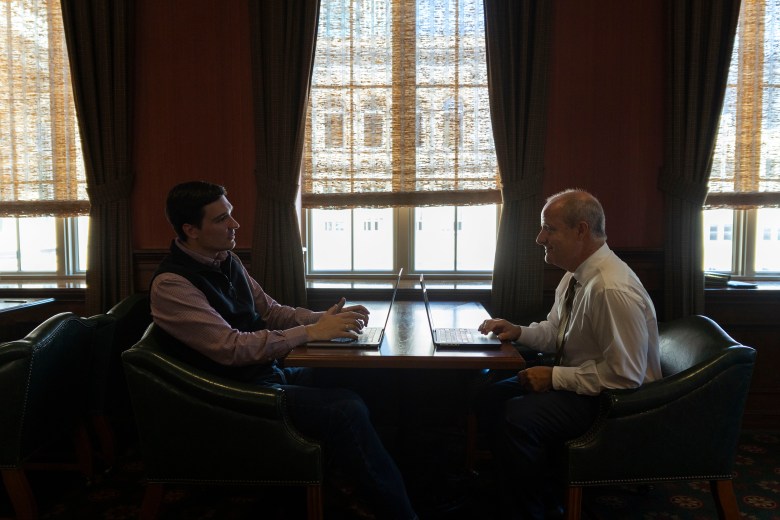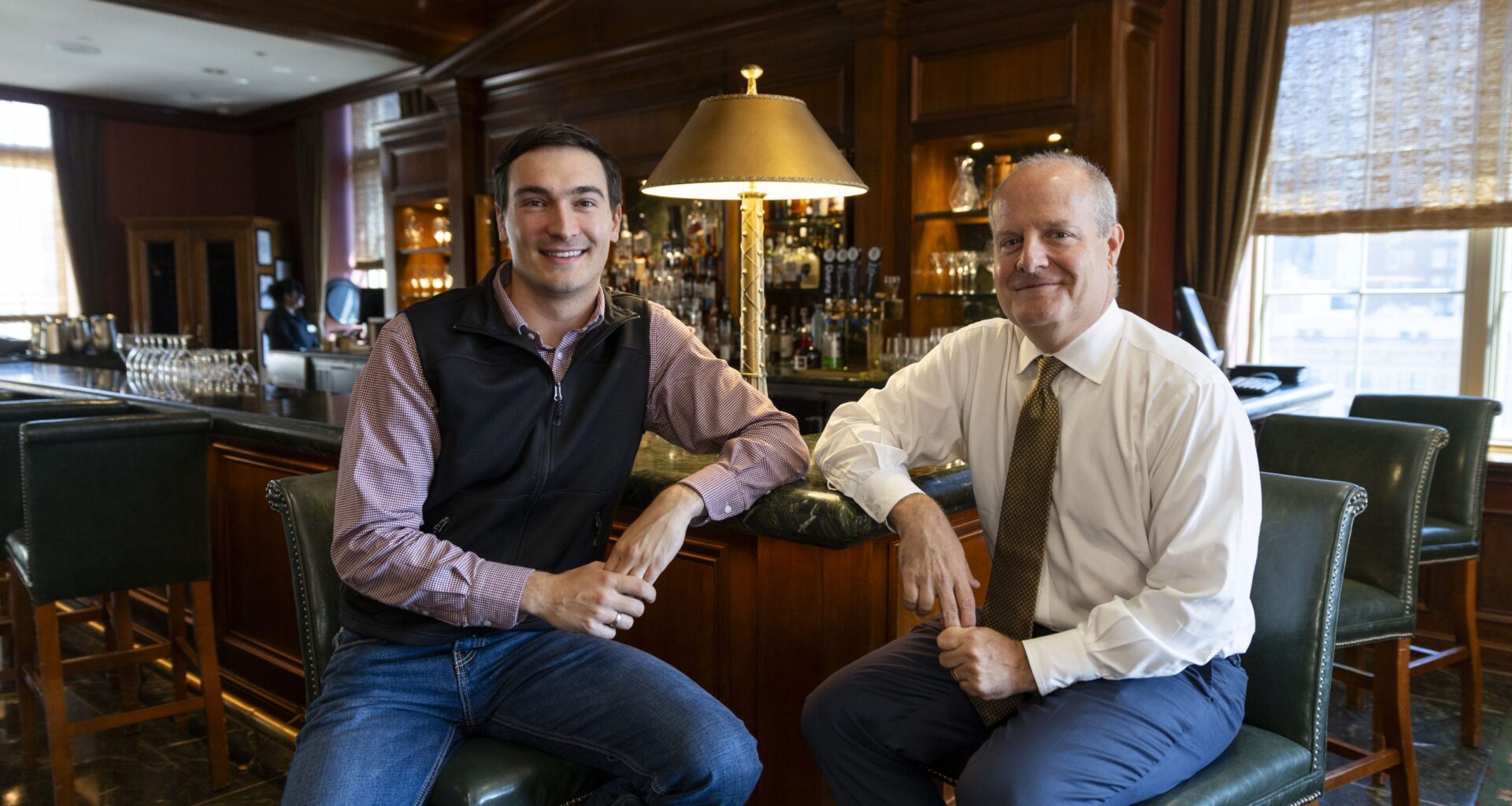Fort Worth-based technology firm CoverGov is using artificial intelligence to generate summaries and transcripts of public meetings.
Entrepreneur Connor Higgins, who grew up in Fort Worth, launched CoverGov in June with a six-employee team that includes software developers and Brinton Payne, a fixture in local government affairs.
CoverGov uses video, agendas and other metadata to create transcriptions of meetings held by thousands of public entities in Texas and other states such as California. Potential clients include the financial sector, government affairs and news media. The company also can build custom tools for clients that let them search its database for meetings using keywords of interest.
Higgins, 24, who previously worked for a legal technology firm in Fort Worth where he ran a team of developers who built products for lawyers, had earlier noodled with Payne, 52, about an AI platform that could analyze large datasets and have broad potential reach. AI technology caught up to the idea, they said.
“Growing up in and around this space, I had friends, family and businesses I knew that were drowning, trying to keep up with this world of government information,” said Higgins, who earned his bachelor’s in economics from Wake Forest University. “We thought there’s got to be a better way to do this. There’s got to be a way to add some simplicity, get people home on time to have dinner with their family.”
Payne compares the volume of information available on the web to oceans.
“A lot of people don’t want to go out to the ocean to catch the fish; they would rather just eat the dinner,” he said.
 CoverGov founder Connor Higgins, left, poses with his business partner Brinton Payne on Aug. 21, 2025, at the Fort Worth Club in downtown. (Mary Abby Goss | Fort Worth Report)
CoverGov founder Connor Higgins, left, poses with his business partner Brinton Payne on Aug. 21, 2025, at the Fort Worth Club in downtown. (Mary Abby Goss | Fort Worth Report)
Complements Documenters
The Fort Worth Report is launching a partnership with CoverGov, which uses artificial intelligence to produce summaries of public meetings in our region. Along with an experienced journalist on our Documenters team, senior editor Scott Nishimura will verify the information and provide the same sort of short stories we’re already generating through our Documenters program.
We intend to use this partnership to extend civic coverage into suburban public entities across and around Tarrant County into which we haven’t yet been able to extend our reach. We remain committed to placing real live Documenters in as many public meetings as possible, too.
These AI-generated and human-edited summaries are part of a pilot program designed to test the new technology, so we want to hear from you about this coverage. Each item created with AI will be clearly identified. Please share your thoughts after you read the reports each week by emailing news@fortworthreport.org.
CoverGov, which Higgins described as financially “bootstrapping” the startup, began beta testing in November before doing its hard launch this summer. Its developers are working to close the gap on accuracy, Higgins said.
“We would like our transcripts to be considered a primary document,” he said. “Already, the technology is more than ear accurate. There are instances where the phonetics of somebody’s name result in a misspelling because that’s what it sounds like, and we’re working on tools right now to smooth that out. But as far as numbers, inflection, information, it’s extremely accurate.”
CoverGov’s transcripts include summaries that highlight what the technology determined were the most important aspects of the meeting. Click on a line in the summary, and the transcript reveals more detailed information about that point in the discussion. The firm’s developers also are working toward improving the model so it better understands controversy.
Another key barrier to building the product is ensuring the platform has a broad array of data and isn’t just tracking one governmental entity, for example, Higgins said.
“You need to have enough information for it to be appetizing to potential clients,” he said.
Other AI models are surfacing across the country that are targeted at news media as potential clients, given the continued decline of local journalism nationally.
A nonprofit Boston group, Cambridge Artificial Intelligencer — led by media executive Charles Kravetz and sales executive Mark Coffey — has raised $650,000 toward a $3.5 million goal to launch an AI-powered platform with tools that journalists can use to follow what’s going on in local government and capture and analyze trends. Cambridge would offer the platform and tools for free to newsrooms, they said.
Kravetz, who led the New England Cable News network for years, “had an inspiration that AI would either be the nail in the coffin for local newsrooms, or the very thing that might save it if there’s a very intentional and studied response,” Coffey said in an interview with Kravetz.
The two cite media industry statistics showing the impact of shrinking newsrooms on American democracy.
“We’re heading toward 100 million Americans living in a proverbial news desert, really, really quickly,” Coffey said. “That’s the crisis in local journalism.”
The group originally was trying to raise $7 million to start its own newsroom, but has switched to its current model. They’ve raised $650,000, including a $500,000 gift from The Navigation Fund, Kravetz and Coffey said.
Kravetz and Coffey described their platform development as being in the “advanced stages.” Using a meeting transcript generated by it, journalists would be able to use the platform to build stories with direct quotes and direct the AI to dive deeper into selected aspects, they said. A journalist toggling over a meeting transcript would be able to highlight any section of it and play the video clip of that part of the meeting.
“This is central to this product,” Kravetz said. “You can check it, you can listen to it.”
Playing a demo of a transcript produced by the platform, he said, “this is a long meeting. It goes for two and half hours. No one’s going to just look through this thing or read this transcript, but you can go to specific parts of it and check to see if it is accurate. That is an essential part of what we’re doing here: giving journalists the tools to trust, but verify, what has been created through artificial intelligence.”
So the model better understands journalism, the group’s developers are loading the app with examples of high-quality journalism, they said.
The app generates summaries highlighting what occurred during the meeting. Reporters using the platform can push a button to rearrange a summary to focus on what they view as the most important piece of the meeting.
The technology isn’t meant to replace human journalists. Rather, the sole journalist in a small newsroom would be able to use the technology to reach substantially more happenings in her community than she is today, they said.
At CoverGov, now in its first year, “our focus is on building trust with and delivering growth to our users, proving the value of turning complex government data into clear, actionable intelligence,” Higgins said. “Growing strong partnerships — especially local ones — is at the core of what we do.”
Looking forward five years, “We see CoverGov as the standard platform for intelligent coverage of government activity, streamlining the way organizations track policy, compliance and municipal trends across the entire country,” he said. “By then, we’ll be known as the go-to layer of clarity between raw government data and the leaders who depend on it.”
Scott Nishimura is a senior editor for the Documenters program at the Fort Worth Report. Reach him at scott.nishimura@fortworthreport.org.At the Fort Worth Report, news decisions are made independently of our board members and financial supporters. Read more about our editorial independence policy here.
Related
Fort Worth Report is certified by the Journalism Trust Initiative for adhering to standards for ethical journalism.
Republish This Story
Republishing is free for noncommercial entities. Commercial entities are prohibited without a licensing agreement. Contact us for details.
